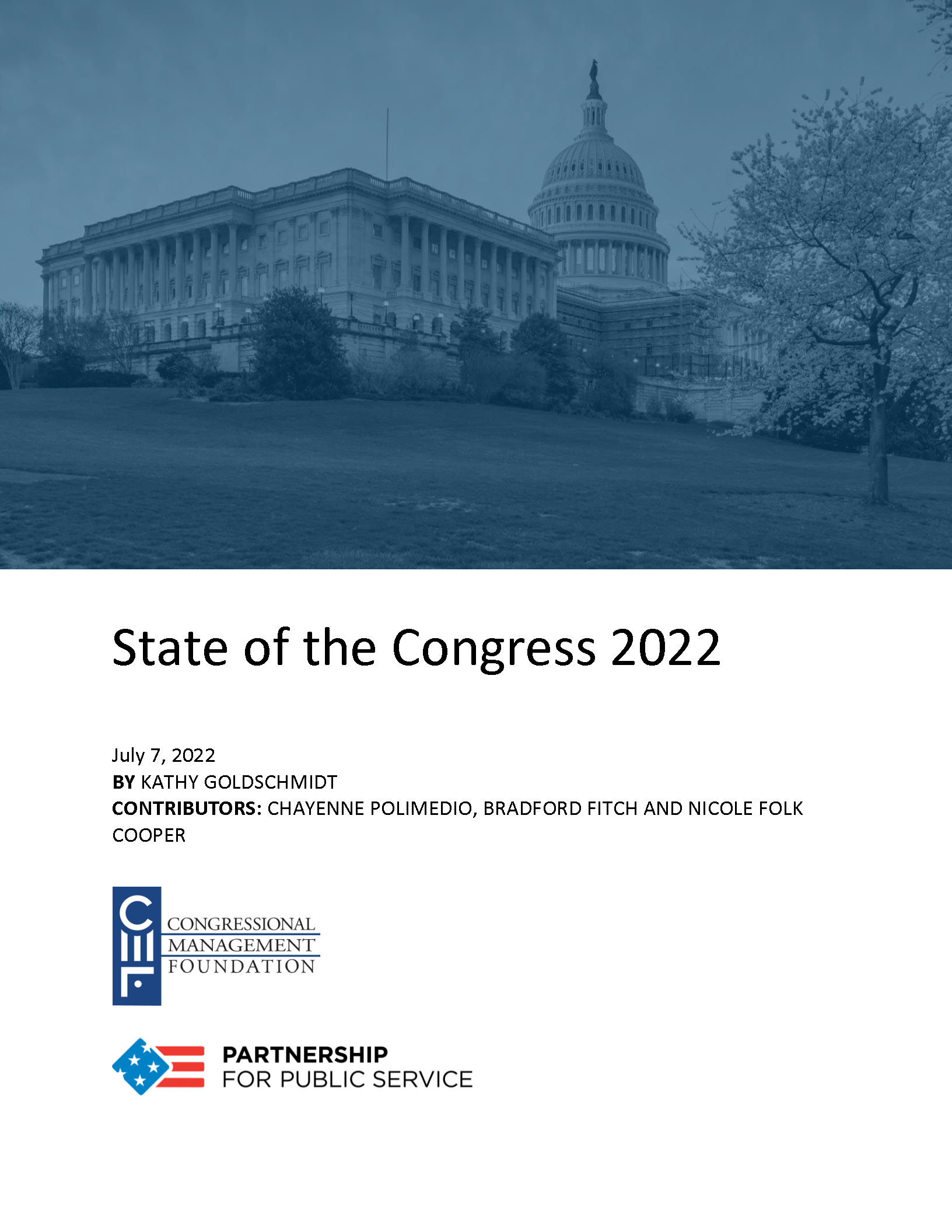 State of the Congress 2022 — a joint project of CMF and the Partnership for Public Service — reveals bipartisan agreement that congressional functionality, civility, and capacity need to improve for Congress to best perform its role in democracy. This report provides an assessment of congressional performance by the people who know the institution best: congressional staff. We created an Exemplary Congressional Staff Cohort to provide insights. They work in personal, committee, leadership, and institutional support offices throughout the Legislative Branch. Two-thirds have worked in Congress for more than 10 years, most are senior managers, and all care deeply about the institution.
State of the Congress 2022 — a joint project of CMF and the Partnership for Public Service — reveals bipartisan agreement that congressional functionality, civility, and capacity need to improve for Congress to best perform its role in democracy. This report provides an assessment of congressional performance by the people who know the institution best: congressional staff. We created an Exemplary Congressional Staff Cohort to provide insights. They work in personal, committee, leadership, and institutional support offices throughout the Legislative Branch. Two-thirds have worked in Congress for more than 10 years, most are senior managers, and all care deeply about the institution.
Though they were not unanimous in their responses, there is a great deal of bipartisan, bicameral agreement on many of the challenges facing Congress. There is also incredible strength in their opinions, with many questions where the majority chose the strongest possible positive or negative response, leaving no doubt as to their sentiment.
- Read the press release
- Read the full report online at the Partnership for Public Service
- Download State of the Congress 2022 (pdf)
- Download the top lines and selected crosstabs (Excel workbook)
Key Findings
During the past two decades, organizations that monitor and support legislatures throughout the world have turned considerable attention to developing benchmarks and frameworks for assessing the democratic performance of these institutions. In 2017, CMF began to use this body of work to produce the report State of the Congress: Staff Perspectives on Institutional Capacity in the House and Senate.
Now, CMF and the Partnership for Public Service have expanded the State of the Congress research to include functionality and civility of the institution.
The key findings of this report are:
- Congress is not functioning as it should. When asked if they agree with the statement, “Congress currently functions as a democratic legislature should,” only 24% agreed and 76% disagreed. Party affiliation had some bearing on the response: More than three-quarters (80%) who work for Democrats and more than two-thirds (68%) who work for Republicans disagreed.
- Polarization and rhetoric are making it more difficult to get things done in Congress. Two-thirds (66%) who work for Democrats and more than half (54%) who work for Republicans “strongly agree” that otherwise non-controversial legislative ideas have failed due to polarization among Members. And an almost equal number of Democrats (66%) and Republicans (70%) “strongly agree” that congressional leadership should enforce the rules and norms of civility and decorum.
- Members’ primary role is solving constituents’ problems. About half of the Congressional Exemplars who work for Democrats (47%) and Republicans (52%) identified “solving constituents’ problems” as Senators’ and Representatives’ most important role. They were generally more satisfied with aspects of public engagement and accountability than with most other aspects of congressional functionality and capacity that we explored with them.
- It is very important for Members and staffers to be civil and to work across party lines. More than three-quarters (77%) said it was “very important” to encourage civility and more than half (59%) said it was “very important” to encourage bipartisanship among Senators and Representatives, but only 1% were “very satisfied” with the current state of either.
- Congressional Exemplars suggest areas where there is clear opportunity for improvement. When asked about the importance of certain reforms recommended by the Select Committee on the Modernization of Congress, there were four that rose to the top as being “very important” to the Congressional Exemplars: reclaiming Congress’ constitutionally-defined duties (74%); improving staff recruitment, diversity, retention, compensation, and benefits (69%); reforming the budget and appropriations process (61%); and ensuring continuity of congressional operations in emergencies (61%).
- Improvement in Congress will likely require building capacity and infrastructure. More than three-quarters (80%) of the Congressional Exemplars said it was “very important” that Congress have adequate capacity and support to perform its role in American democracy and almost as many (74%) said it was “very important” that Congress’ technological infrastructure is adequate to support Members’ official duties. Yet only 5% were “very satisfied” with the current state of capacity and support and just 4% with the current technological infrastructure.
At present, partisanship is changing the nature and practice of American democracy, and Americans no longer agree on what were once deeply-held and understood democratic values. Without a national conversation centered on a high-functioning national legislature, we cannot work out our differences and align on a common understanding of how we will practice our democracy moving forward. By sharing this data, CMF and the Partnership for Public Service hope to contribute to this critical conversation.


